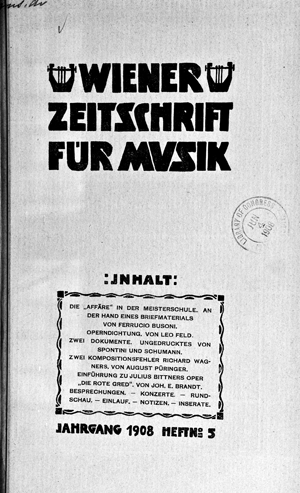Wiener Zeitschrift für Musik
Prepared by Ole Hass
Online only (2015)

The Wiener Zeitschrift für Musik [Viennese journal for music (WZE)] was published from January to April, 1908. Only five issues of twenty-four planned issues appeared, of which numbers two and three are combined as a double issue, containing 114 numbered pages. With Armin Kohlführst as proprietor, the eloquent and sympathetic Richard Specht (1870-1932) served as editor of the journal that can by many standards be considered as a forerunner to Specht’s more successful journal, Der Merker (1909-1922).
Each issue contains one or more principal articles, a thematic analysis of a composition slated for its first performance, and extensive accounts of opera and concert performances in Vienna. These are followed by shorter reviews of musical publications and the miscellaneous sections “Rundschau” [Overview] describing new publications, and “Notizen” [Notes] containing remarks about musicians.
In the first issue, an opening article with musings on the nature of music by the influential cultural critic Hermann Bahr is followed by a greeting from Specht to Felix Weingartner, who followed Gustav Mahler as director of the Vienna Court Opera. Weingartner receives commentary of mixed gratitude from Specht throughout the journal. The eclectic composer Gerhard Keußler contributes a historical-aesthetical essay in multiple installments on the Palestrina style. August Püringer analyses details of text setting in Wagner’s Der Ring des Nibelungen.
A special feature are the thematic analyses (later continued in Der Merker), which treat Franz Ondriček’s String Quartet in A-flat major, Siegmund von Hausegger’s symphonic poem Wieland der Schmied (the analysis contributed by the composer), Weingartner’s Symphony No. 2 in E-flat major, and a plot synopsis and analysis of leitmotifs of Julius Bittner’s opera Die rote Gred [The red Gred].
Reviews of first performances of opera in Vienna (at the Court Opera and the Volksoper) include Carl von Goldmark’s Wintermärchen [A Winter’s Tale], Giacomo Puccini’s Manon Lescaut, Antonio Smareglia’s Istrianische Hochzeit [Le Nozze istriane], Eugen d’Albert’s Tiefland, Siegfried Wagner’s Sternengebot and Paul Dukas’ Ariane und Blaubart, as well as Franz Lehár’s operetta Der Mann mit den drei Frauen [The man with three wives]. Concert reviews appear more like overviews of countless solo recitals, including many “Liederabende” (one by Theo Drill-Orridge, exclusively featuring songs by Franz Schreker) and orchestral concerts which include Max Reger’s Variations on a theme by Hiller and Mahler’s Symphony no. 1, as conducted by Oskar Nedbal. Noteworthy is a discussion of the young pianist and conductor George Szell.
Letters, sometimes in facsimile, by Gasparo Spontini, Schumann, Wagner, Liszt, Wolf, Ferruccio Busoni and Nietzsche and recollections about Bruckner can also be found in this short but valuable journal.
